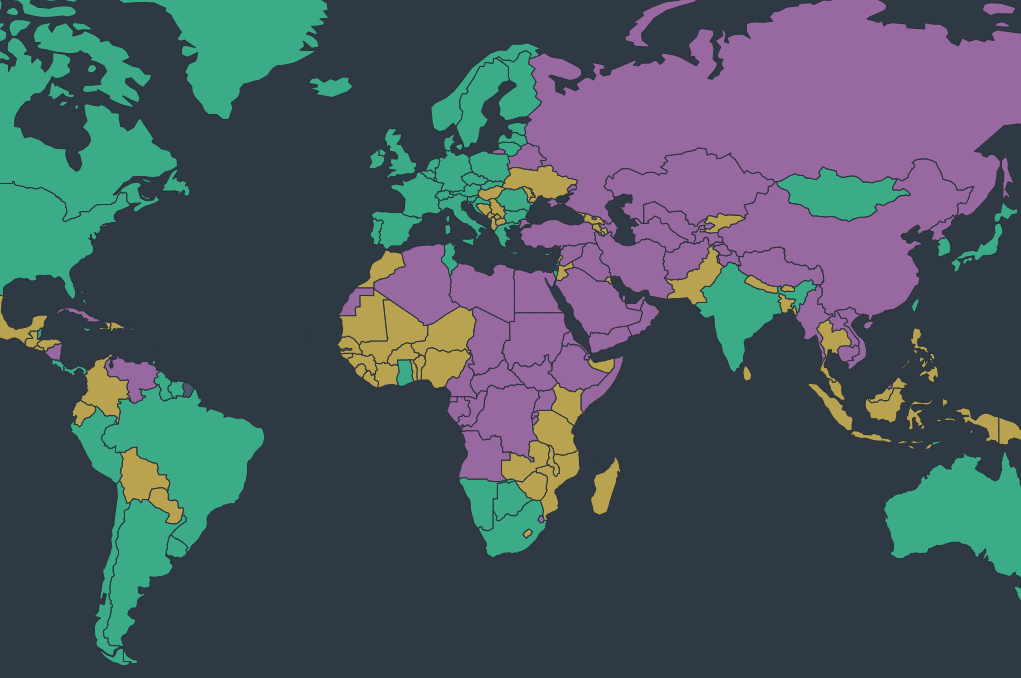According to the Freedom House’s “Freedom in the World 2020” report, Estonia is considered a free country and its score didn’t decline compared with the previous year, despite the report mentioning that a far-right party made electoral gains; around the world, however, democracy is under assault and 2019 was another year of decline in global freedom.
The latest “Freedom in the World” annual report is pessimistic in overall tone – 2019 was the 14th consecutive year of decline in global freedom, it says.
“Democracy and pluralism are under assault. Dictators are toiling to stamp out the last vestiges of domestic dissent and spread their harmful influence to new corners of the world. At the same time, many freely elected leaders are dramatically narrowing their concerns to a blinkered interpretation of the national interest,” the report said. “In fact, such leaders – including the chief executives of the United States and India, the world’s two largest democracies – are increasingly willing to break down institutional safeguards and disregard the rights of critics and minorities as they pursue their populist agendas.”
The gap between setbacks and gains widened, compared with 2018, as individuals in 64 countries experienced deterioration in their political rights and civil liberties while those in just 37 experienced improvements. “More than half of the countries that were rated Free or Not Free in 2009 have suffered a net decline in the past decade. Ethnic, religious, and other minority groups have borne the brunt of government abuses in both democracies and authoritarian states,” the Freedom House report said.
Estonia is one of the countries where the “freedom score” didn’t decline – the country scored 94 out of 100 (the same score as in the 2019 report) and is considered a free country (with the exception of Hungary that is “partly free”, all other European Union member states are “free”). However, the report mentions the political far-right rise as a cause for concern. “Far-right parties made electoral gains in Estonia, where the Conservative People’s Party entered government for the first time,” it says (the full country reports, including Estonia’s, will be published on 11 March).
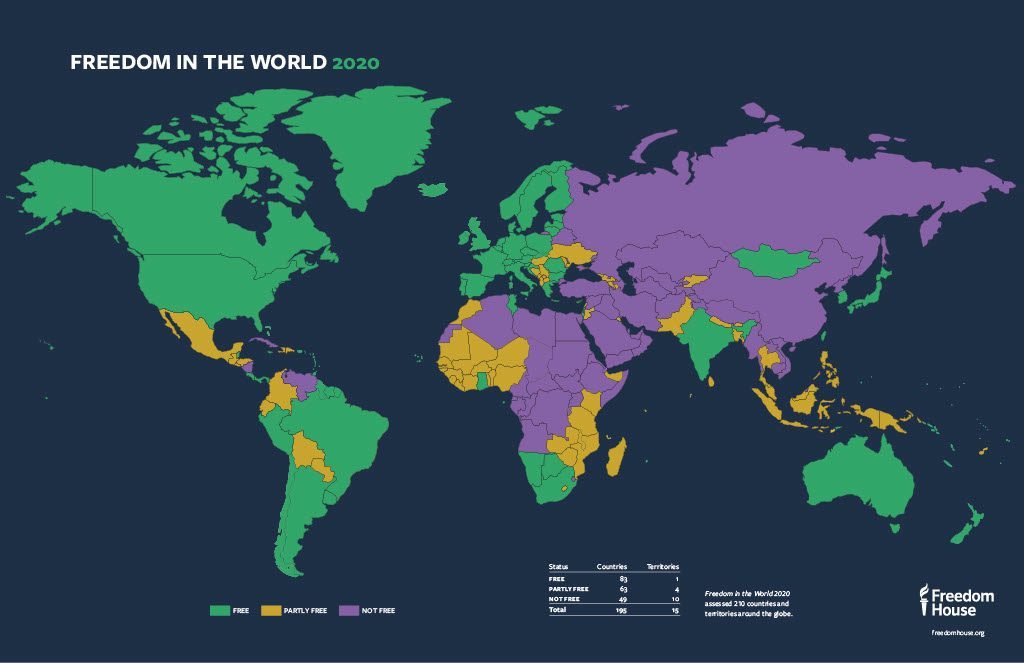
According to the rankings (out of 100), the most free countries in the world are Finland (100), Norway (100), Sweden (100), the Netherlands (99), Luxembourg (98), Uruguay (98) and Canada (98). The least free are Syria (0), Turkmenistan (2), Eritrea (2), South Sudan (2) and North Korea (3).
China one of the worst-performing countries
One of the countries prominently singled out in the report is China – and not positively. “One of the year’s most appalling examples of domestic repressions – made more frightening by the absence of a coordinated international response – was the Chinese Communist Party’s ongoing campaign of cultural annihilation in Xinjiang,” Freedom House said.
“Mass violations of the basic freedoms of millions of Uighurs and other Muslim minorities in the region, which were first brought to light in 2017, continued in 2019, with hundreds of thousands of people sentenced to prison or detained for forced indoctrination. The crackdown also included forced labor, the confinement of detained Muslims’ children in state-run boarding schools, and draconian bans on ordinary religious expression.”
These policies have contributed to China’s ranking as one of the 15 worst-performing countries in Freedom in the World 2020, and one of only 11 countries that Freedom House flagged for evidence of ethnic cleansing or some other form of forced demographic change.
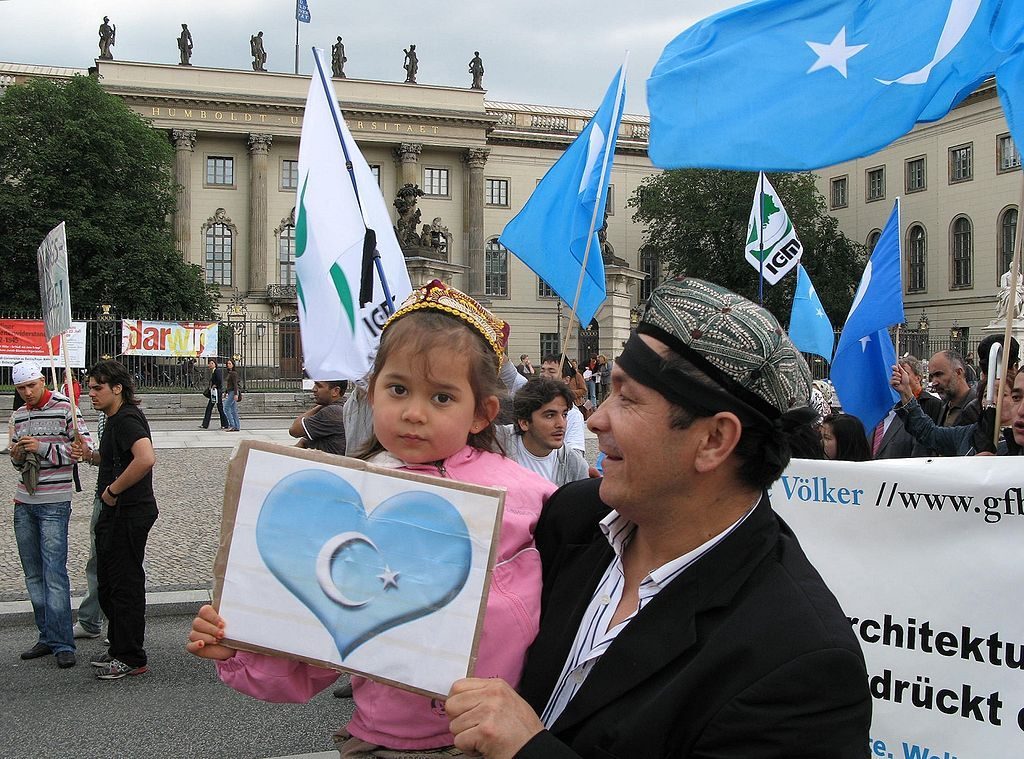
The report is very critical about the lack of an international response to Chinese repressions. “The United States and other democracies have made some important diplomatic statements against the repression in Xinjiang, and the Trump administration has imposed sanctions on specific Chinese entities associated with the campaign. But in general the world’s democracies have taken few steps to rally international opposition or apply meaningful collective pressure to halt China’s rights abuses, and elected leaders in Europe and elsewhere have often been tepid in their public criticism.”
The report says that the “pattern of de facto impunity” bolsters China’s broader efforts to demand recognition as a global leader and aids its relentless campaign to replace existing international norms with its own authoritarian vision. The report also cites several examples across the world where China aimed to influence elections – in Taiwan, Australia, New Zealand – and denounced and threatened journalists (in Russia and Sweden).
Freedom in the World 2020 is also critical of the Donald Trump administration. “Democracy advocates around the world have historically turned to the United States for inspiration and support, and Congress has continued to fund programs to that end in practice. To date, however, the Trump administration has failed to exhibit consistent commitment to a foreign policy based on the principles of democracy and human rights,” the report said, adding that Trump has given a pass to tyrannical leaders whom he hopes to woo diplomatically, including Vladimir Putin of Russia and Kim Jong-un of North Korea. “On multiple occasions during 2019, he [Trump] vetoed bipartisan efforts in Congress to limit arms sales and military assistance to Saudi Arabia.”
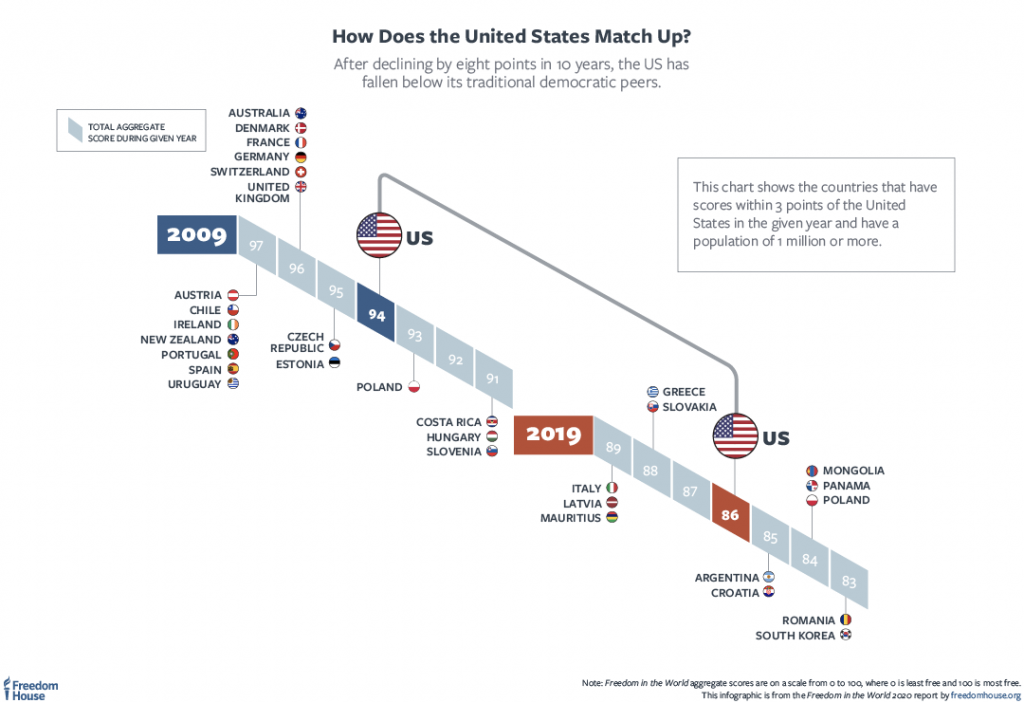
A democratic solidarity
The report highlights positively that a “striking number” of new citizen protest movements have emerged over the past year, reflecting the “inexhaustible and universal desire” for fundamental rights, but the protests have achieved very little. “The protests of 2019 have so far failed to halt the overall slide in global freedom, and without greater support and solidarity from established democracies, they are more likely to succumb to authoritarian reprisals.”
“Local movements of citizens should not be expected to confront entrenched power structures – often backed by powerful foreign autocracies – without some form of assistance. International democratic actors can help these movements achieve their goals, blunt authoritarian reprisals, and convert breakthrough moments into long-term gains,” Freedom in the World 2020 says, calling for a global democratic solidarity.
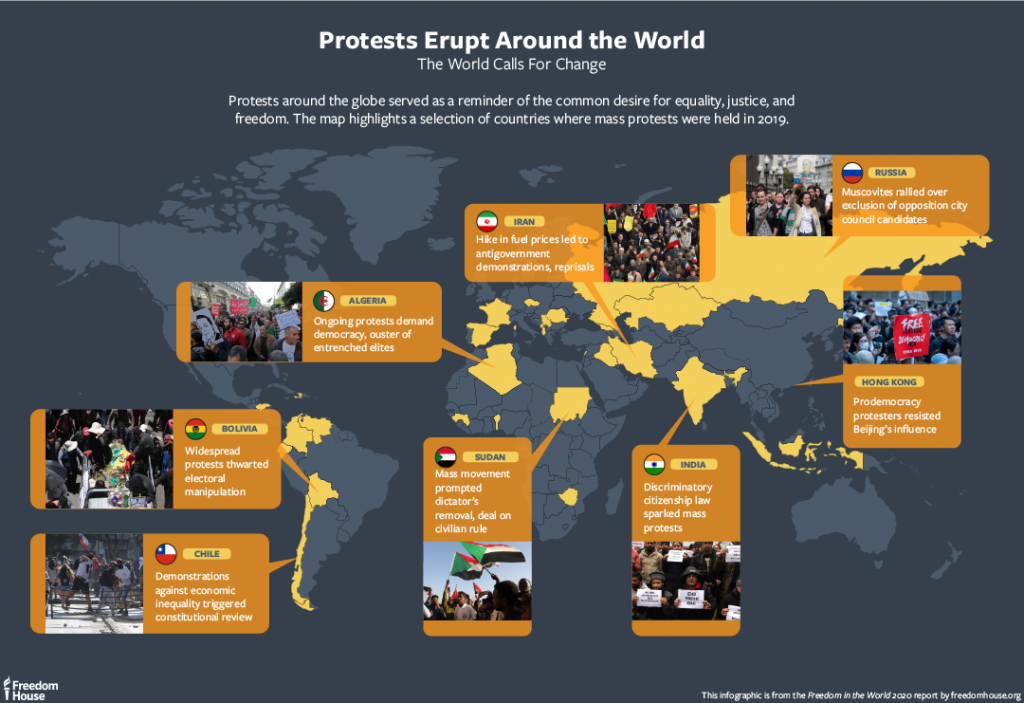
The report says that “unfortunately, instead of consistent and constructive engagement”, the world’s democratic powers in 2019 offered only “fitful support, frequent indifference or ambiguity”, and at times outright abandonment. “Those in the United States and elsewhere who doubt the value of a foreign policy designed to advance human freedom should realize that no one’s rights are safe when tyranny is allowed to go unchecked. History has shown that the chaotic effects of authoritarian misrule abroad are not confined by national borders, and that authoritarian powers will seek to expand their control by subverting the democratic sovereignty of other states.”
The report also contains several very specific proposals on how to strengthen and protect core values in established democracies:
- Respect, protect, and fulfil human rights at home.
- Strengthen public support for democratic principles by investing in civic education.
- Guard against the manipulation of open democracies by authoritarian actors by: 1) Fighting manipulation of media and social media. 2) Increase transparency requirements for foreign state-owned propaganda outlets operating in democratic states. 3) Require social media companies to report foreign efforts to spread online disinformation and propaganda. 4) Address the use of bots on social media. 5) Preventing election interference. 6) Strengthening laws that guard against foreign influence over government officials. 7) Preventing corrupt foreign officials from laundering stolen assets through democracies. 8) Making the fight against kleptocracy and international corruption a key priority.
- Restrict the export of sophisticated surveillance tools to unfree countries, and require businesses exporting dual-use technologies to report on the human rights impact of those products.
The Freedom in the World report was launched in 1973. It produces annual scores representing the levels of political rights and civil liberties in each state and territory, on a scale from 1 (most free) to 7 (least free). Depending on the ratings, the nations are then classified as “free”, “partly free” or “not free”. Freedom House is a US-based non-governmental organisation that conducts research and advocacy on democracy, political freedom and human rights.

